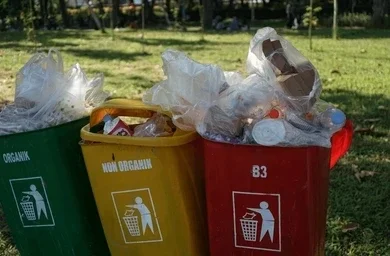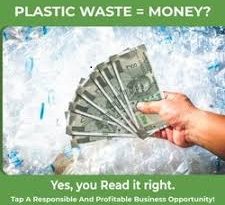How To Generate Money From Inorganic Wastes
As the world grapples with environmental challenges, there is an increasing realization of the need to adopt sustainable practices. Inorganic wastes, such as plastics, metals, and glass, presents a significant concern due to its persistence in the environment.
However, this waste stream also holds immense potential for generating revenue through innovative approaches. This article aims to explore strategies and avenues for generating money from inorganic waste, highlighting the benefits of adopting a circular economy mindset.
Ways To Generate Income From Inorganic Wastes

1. Understanding the Circular Economy
The circular economy is an economic model that aims to minimize waste and maximize resource utilization. It promotes the concept of closing the loop, where materials and products are recycled, reused, or repurposed rather than being disposed of.
Embracing a circular economy approach is crucial for harnessing the economic potential of inorganic waste.
2. Recycling and Recovery
One of the most prominent methods for generating revenue from inorganic waste is recycling. Recycling involves processing waste materials to extract valuable resources, which can then be sold or used for manufacturing new products.
Setting up recycling facilities or partnering with existing ones provides an opportunity to earn profits through the collection, sorting, and processing of inorganic waste.
3. Upcycling and Repurposing
Another lucrative approach is upcycling and repurposing inorganic waste. This involves transforming waste materials into higher-value products with improved functionality or aesthetics.
By leveraging creativity and innovative design, entrepreneurs can breathe new life into discarded items, creating unique and marketable goods. Upcycled products often appeal to environmentally conscious consumers, offering a niche market with the potential for higher profit margins.
4. Resource Recovery and Energy Conversion
Inorganic waste can also serve as a valuable source of secondary raw materials and energy. Advanced technologies, such as waste-to-energy conversion systems, enable the recovery of energy from waste through processes like incineration or anaerobic digestion.
These energy recovery methods not only reduce the environmental impact of waste but can also generate electricity or heat, providing an additional revenue stream.
5. Collaborating with Stakeholders
Building partnerships and collaborations with various stakeholders is essential for successful monetization of inorganic waste. Engaging with local communities, waste management companies, manufacturers, and government agencies can help create a comprehensive waste management ecosystem.
Joint ventures, strategic alliances, and public-private partnerships can provide the necessary expertise, infrastructure, and market access to maximize the economic potential of inorganic waste.
6. Innovative Business Models
To generate money from inorganic waste, entrepreneurs must explore innovative business models. Examples include waste collection and segregation services, waste brokerage, material recovery facilities, and product design studios focused on upcycling.
Additionally, developing a brand image that emphasizes sustainability and environmental responsibility can attract customers who prioritize ethical consumption, thereby increasing market demand and profitability.
8. Research and Development
Investing in research and development is crucial for unlocking new opportunities and driving innovation in the inorganic waste sector. Continuous research efforts can lead to the development of novel technologies, processes, and materials that further enhance waste management practices. Additionally, exploring emerging markets and identifying untapped niches can provide a competitive advantage and open up new revenue streams.
9. Market Analysis and Product Development
Conducting a thorough market analysis is crucial before diving into any business venture related to inorganic waste. Identifying market trends, consumer preferences, and competition will help inform product development and target the right audience.
Understanding which waste materials are in high demand or have limited supply can guide entrepreneurs in selecting the most viable options for generating revenue.
Read Also: How To Generate Money From Fly Ash
10. Education and Awareness Programs
Raising awareness about the importance of waste management and the potential economic benefits of inorganic waste can significantly contribute to revenue generation.
Education campaigns targeting individuals, businesses, and communities can promote behavioral change, encouraging proper waste disposal, recycling, and participation in waste collection programs.
Furthermore, organizing workshops, seminars, and training sessions can empower entrepreneurs and individuals to explore opportunities and build necessary skills in waste management and recycling.
11. Government Incentives and Policies
Government support through incentives, grants, and favorable policies can accelerate the monetization of inorganic waste. Governments can play a crucial role in promoting sustainable practices by offering tax incentives, subsidies, or grants for businesses involved in waste management and recycling.
Additionally, enacting legislation that mandates proper waste disposal and encourages the use of recycled materials in manufacturing can create a more conducive environment for generating revenue from inorganic waste.
12. International Collaboration and Export Opportunities
The global nature of waste management challenges presents opportunities for international collaboration and export of waste-derived products. Identifying potential markets for recycled or upcycled products beyond domestic borders can open up new revenue streams. Collaborating with international partners, participating in trade fairs, and exploring export opportunities can expand the reach and profitability of businesses focused on generating money from inorganic waste.
13. Continuous Improvement and Adaptation
The landscape of waste management and recycling is ever-evolving, with new technologies and approaches constantly emerging. Entrepreneurs in this sector must stay abreast of industry advancements and continuously seek ways to improve their processes and offerings.
Adapting to changing market dynamics, consumer demands, and technological advancements ensures the long-term viability and profitability of ventures related to inorganic waste.
Read Also: How To Generate Money From Industrial Waste
14. Financial Management and Cost Optimization
Effectively managing finances and optimizing costs is essential for the profitability of ventures focused on generating money from inorganic waste. Analyzing and minimizing operational expenses, such as waste collection, transportation, and processing costs, can enhance the overall financial performance.
Additionally, exploring opportunities for funding, grants, or investment partnerships can provide the necessary capital for scaling operations and implementing innovative technologies.
15. Quality Control and Assurance
Maintaining high-quality standards is crucial when dealing with inorganic waste and derived products. Implementing robust quality control measures throughout the collection, sorting, and processing stages ensures that the final products meet market requirements and regulations.
Consistently delivering products of superior quality helps build customer trust, enhances brand reputation, and increases the potential for generating higher revenues.
16. Market Diversification
To mitigate risks and explore additional revenue streams, diversification of markets and product offerings is crucial. Identifying new applications and markets for recycled or upcycled products beyond the traditional sectors can tap into unexplored opportunities.
For example, collaborating with industries like construction, fashion, or furniture manufacturing can provide outlets for innovative products made from inorganic waste.
17. Monitoring and Reporting
Establishing a robust monitoring and reporting system is essential for tracking key performance indicators, assessing progress, and making informed business decisions.
Regularly monitoring waste collection volumes, recycling rates, revenue generation, and customer feedback provides valuable insights for optimizing operations and identifying areas for improvement.
Transparent reporting can also help build trust with stakeholders and attract investors interested in sustainable and profitable ventures.
18. Environmental Certifications and Standards
Obtaining relevant environmental certifications and adhering to sustainability standards can differentiate businesses focused on generating money from inorganic waste.
Certifications such as ISO 14001 or certifications specific to the recycling industry demonstrate a commitment to environmental responsibility and quality management.
These certifications can enhance credibility, attract environmentally conscious customers, and facilitate access to markets that prioritize sustainable practices.
19. Continuous Learning and Networking
The landscape of waste management and sustainability is constantly evolving. Engaging in continuous learning, staying updated on industry trends, and participating in relevant conferences, workshops, and networking events is crucial for staying ahead of the curve.
Networking with professionals, experts, and industry leaders can provide valuable insights, foster collaboration opportunities, and inspire innovation in the pursuit of generating revenue from inorganic waste.
Generating money from inorganic waste requires a strategic and comprehensive approach that encompasses financial management, quality control, market diversification, and continuous learning.
By adopting best practices, leveraging technology, and embracing a sustainable mindset, entrepreneurs can unlock the economic potential of inorganic waste while contributing to the transition towards a more circular and environmentally conscious economy.
With the right strategies and a commitment to innovation, ventures focused on inorganic waste can thrive, making a positive impact on both the bottom line and the planet. Generating money from inorganic waste requires a multifaceted approach that encompasses market analysis, product development, education, government support, and international collaboration.
By embracing innovation, sustainability, and collaboration, individuals and businesses can unlock the economic potential of inorganic waste while contributing to a cleaner and more sustainable future.
As we move towards a circular economy, the opportunities for revenue generation from inorganic waste will continue to expand, making it an attractive and viable venture for those seeking to make a positive impact on both the environment and their bottom line.
Generating money from inorganic waste requires a holistic approach that encompasses recycling, upcycling, resource recovery, and collaboration with stakeholders.
By adopting a circular economy mindset and leveraging innovative strategies, individuals and businesses can not only contribute to environmental sustainability but also capitalize on the economic potential of inorganic waste. Embracing these opportunities has the potential to create a win-win scenario, benefiting both the economy and the environment.
Read Also: Dive into Deliciousness with These Fishbowl Drinks Recipes



